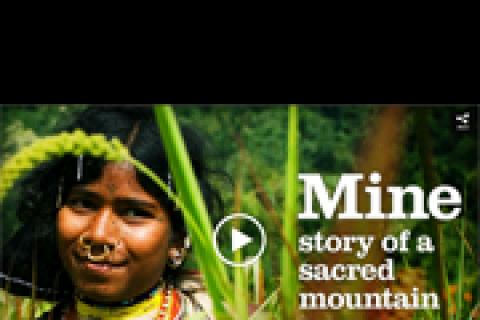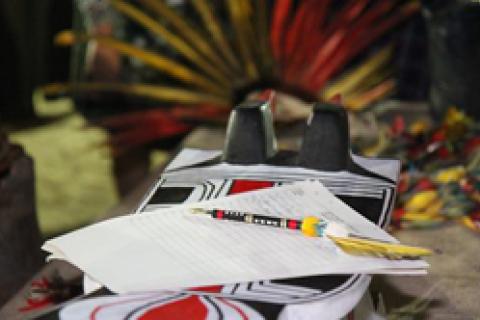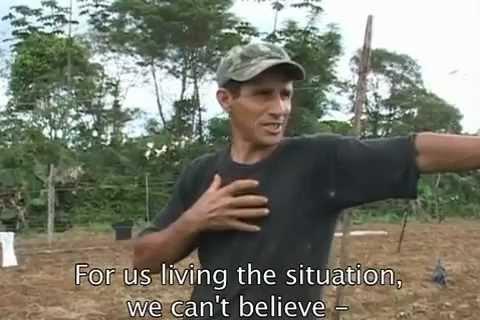By Survival. This short film, narrated by Joanna Lumley, tells the story of the Dongria Kondh’s resistance. Vedanta are intent on constructing an open-cast mine on their land and thereby destroying the tribes sacred mountain and with it everything they know.
The Supreme Court has given the Dongria three months to decide whether to allow mining in the hills.
Other information
At 20 years of the “Earth Summit”, the United Nations Conference on the Environment and Development, La Via Campesina sees not only that the real causes of environmental, economic, and social deterioration continue without being attacked but also that Rio+20 will serve to deepen neoliberal policies and processes of capitalist expansion, concentration, and exclusion that today have enveloped us in an environmental, economic, and social crisis of grave proportions.
In April we shared the call of a number of international civil society organizations and social movements to social organizations to sign on a statement and join the campaign to reclaim the UN as a peoples' space (http://www.foei.org/en/get-involved/take-action/end-un-corporate-capture) against the “corporate capture” of UN and Rio+20.
Movements and organizations from Asia have made a declaration rejecting the “Green Economy” being proposed by global institutions and now the subject of debate in the Rio+20 process, for several reasons including:
“Economía verde. El asalto final a los bienes comunes” (Green Economy: The final assault on the commons), only in Spanish, is a “copyright-free” publication jointly produced by GRAIN, Alianza Biodiversidad, World Rainforest Movement (WRM) and Friends of the Earth Latin America and the Caribbean (ATALC). The report addresses the deepening of the climate and environmental crisis and how governments and corporations are working to turn it into a profitable new area of business they call the “green economy”.
From Rio de Janeiro, the convergence of social movement’s communication media, through Radio Mundo Real, brings us the Peoples Summit with live programming, news, interviews, testimonies, stories, special reports, videos, covering issues such as water, resisting neoliberalism, forests and biodiversity, human rights, gender, extractive industries, climate justice and energy, food sovereignty.
Access Convergence at http://www.radiomundoreal.fm/es?lang=en
“The Story of REDD: a real solution to deforestation?” available athttp://www.fern.org/node/5110 is a film produced by FERN. The video deals with one of the most controversial issues in the climate change debate, the REDD mechanism. Behind the basic concept that governments, companies or forest owners in the South should be rewarded for keeping their forests instead of cutting them down there are more complex issues that must be considered by any initiative to reduce deforestation. The devil, as always, is in the details.
Produced by La Antena and AttacTV, the short animated film deals with the takeover of nature by financial markets and the real alternatives coming up from the civil society. The video is an initiative of SOMO, European Attac Network, Food&Water Europe, Friends of Earth, Amis de la Terre, Carbon Trade Watch, WEED, Ecologistas en Acción, Aitec and Campagna per la riforma della Banca Mondiale.
In the negotiating process leading up to the Rio+20 conference some rich-country governments and influential business groups have sought to impose a regression from the principles agreed at the 1992 Earth Summit – such as the principle of common but differentiated responsibilities, the precautionary principle, and the right to information and participation – and to undermine certain rights that have already been achieved, such as the rights of indigenous peoples, traditional communities, peasant farmers, and others.
We, the Indigenous Peoples of Mother Earth assembled at the site of Kari-Oka I, sacred Kari-Oka Púku, Rio de Janeiro to participate in the United Nations Conference on Sustainable Development Rio+20, thank the Indigenous Peoples of Brazil for welcoming us to their territories. We reaffirm our responsibility to speak for the protection and enhancement of the well-being of Mother Earth, nature and future generations of our Indigenous Peoples and all humanity and life.
Introduction and notes by Chris Lang
Source: http://www.redd-monitor.org
By FERN. Community voices about a forest carbon offset project.
frameborder="0" width="640" height="480">





